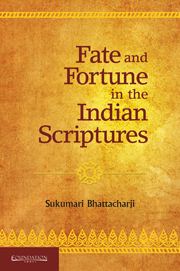Book contents
- Frontmatter
- Contents
- Preface
- Introduction
- Chapter 1 Inception
- Chapter 2 Rebirth and Transmigration
- Chapter 3 Karman and its Consequences
- Chapter 4 Karman, Fate and Free Will
- Chapter 5 Fate, Eschatology and Liberation
- Chapter 6 Premonitions and Presages
- Chapter 7 Deflection: Remedial Measures
- Chapter 8 Vicarious Deflection
- Chapter 9 Fate and Human Endeavour
- Bibliography
- Index
Chapter 3 - Karman and its Consequences
Published online by Cambridge University Press: 05 October 2014
- Frontmatter
- Contents
- Preface
- Introduction
- Chapter 1 Inception
- Chapter 2 Rebirth and Transmigration
- Chapter 3 Karman and its Consequences
- Chapter 4 Karman, Fate and Free Will
- Chapter 5 Fate, Eschatology and Liberation
- Chapter 6 Premonitions and Presages
- Chapter 7 Deflection: Remedial Measures
- Chapter 8 Vicarious Deflection
- Chapter 9 Fate and Human Endeavour
- Bibliography
- Index
Summary
IT was in the middle of the first millennium B.C. that rebirth came to be associated with karman: a man was reborn according to what he did in his life on earth. This association had many facets. In the first phase rebirth had reference only to the future, but with karman it was a two-ended position: a man's past karman determines his present station and his present station decides how he will fare in the future. Now, with the Jātakas a man could be born as a God or as subhuman being, a sondergötter-a yakṣa, piśāca, gandharva, kinnara, rākṣasa, nāga, any animal, bird, serpent, insect, aquatic or atmospheric creature. “Sin and piety in this life result in birth in hateful or covetable stations (in the next).” As tree-spirits and river-spirits they could, to some extent, be identified with aspects of nature. The scope and possibility of rebirth thus widened to illimitability. Secondly, now there appeared a pseudological chain of causality: certain karmans yielded certain results. Thirdly, divine intervention and the role of the supernatural in controlling the course of a man's life was admitted. Fourthly, now fate became a myriad-named divinity. We shall deal with most of these aspects in the following chapters, but karman opened up a large vista which rebirth by itself could never do.
- Type
- Chapter
- Information
- Fate and Fortune in the Indian Scriptures , pp. 43 - 77Publisher: Foundation BooksPrint publication year: 2014

